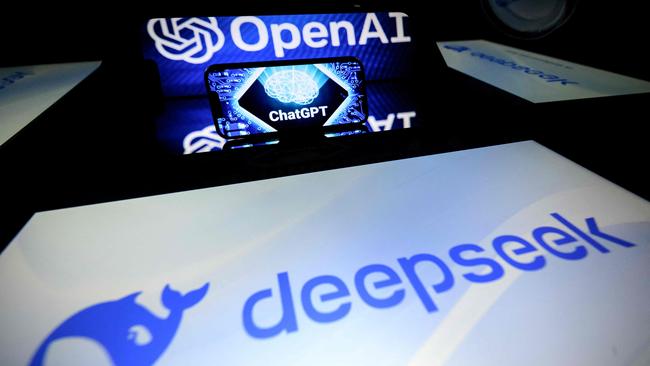Firms ditch OpenAI for DeepSeek
Silicon Valley is jumping on the back of the Chinese entry into the artificial intelligence market, with some of the world’s biggest companies shifting away from established brands despite being significant investors.

The arrival of DeepSeek, a super-cheap yet powerful artificial intelligence system from a little-known Chinese firm, has sent Silicon Valley into a psychological tailspin. Over just a few days, Big Tech appeared to go through all seven stages of acceptance. It started with shock. This was “a Sputnik moment”, exclaimed billionaire investor Marc Andreessen about DeepSeek, which, depending on how you crunch the numbers, offers a state-of-the art AI reasoning model for one-twentieth the cost of a rival such as OpenAI.
Denial and anger swiftly followed. San Francisco-based OpenAI said the firm may have “inappropriately” pirated its technology. Depression - one commentator called DeepSeek’s breakthrough an “extinction-level event” for investors who had ploughed hundreds of billions of dollars into AI start-ups - was followed by reconstruction, the “upward turn” and, finally, acceptance. And all before Thursday.
Indeed, even as OpenAI alleged malfeasance, Microsoft, its single biggest investor and most important partner, was integrating DeepSeek into its Azure cloud computing offering. Amazon’s AWS did the same. DeepSeek is here to stay.
Why have America’s Big Tech champions - the same companies that have poured billions of dollars into the AI companies that DeepSeek undermines - embraced the Chinese interloper founded by Liang Wenfeng?
“Because customers want it,” said Ed Sim, founder of Boldstart, a venture capital firm. All of his start-ups, he said, were looking at ways to swap DeepSeek for the expensive AI models being pumped out by OpenAI and its ilk. “A few years’ worth of cost compression just happened in a matter of days,” he added.
As the dust cleared, businesses worldwide were asking the same question: should they use DeepSeek too? The answer for many will be a resounding yes - but with important caveats.
OpenAI and Anthropic, the leading developers of private AI models, are not cheap. Companies that use their tools to, say, power a customer service chatbot pay a fee based on “tokens”. OpenAI defines a token as four letters or spaces, so that 100 tokens roughly equals about 75 words that are either entered into its chatbot as a question, or produced as an answer. The price per token depends on the model being used; the more powerful the model, the higher the price.
Enter DeepSeek. The most profound move by the company, spun out by founder Liang Wenfeng from his hedge fund, High Flyer, was to make its model open source. That means anyone can download it onto their servers, use it free of charge and, importantly, modify it as they see fit.
Doing so is not trivial. DeepSeek’s models are large and require immense amounts of computing power. What is more, changing its “weights” - the algorithmic values that determine the answers it gives - requires deep technical knowledge. But it can be done.
Perplexity, an AI-powered search engine start-up in San Francisco, downloaded DeepSeek’s reasoning model, the system that shows the “thought process” that leads to its answers, onto its servers on US soil. It then doctored it to “Americanise” the output, before launching a version of its search engine last week that runs on top of it.
Making those changes was critical, as DeepSeek’s default settings do not allow content critical of, say, the Chinese Communist Party (CCP) or the Tiananmen Square massacre. “We’ve been sprinting to make it truly uncensored,” said Dmitry Shevelenko, a Perplexity executive. “For the vast majority of cases, it gives very impartial answers.”
There is also the question of data security. DeepSeek’s servers are based in China, where any company must comply with stringent oversight from the CCP, up to and including allowing the government to access user data. That is why, Sim said, he advises anyone against downloading the DeepSeek app, the number-one “productivity” app in Apple’s App Store. “All that data on your phone gets tracked, it goes into China. Who knows what they do with it?”
The US navy banned the use of DeepSeek last week due to “security concerns”.
However, what is certain is that the breakthroughs underlying DeepSeek are an unalloyed good for businesses and governments seeking to integrate AI. That is because its advances will be swiftly integrated by rivals across the industry.
Because of America’s semiconductor export ban against China, DeepSeek was forced to use mostly Nvidia’s H800 chip, a less powerful processor than the H100s used by other AI labs to train their models. DeepSeek rewrote some of the chip’s software, a huge technical feat, for extra performance.
They also pioneered an approach that draws only on relevant portions of the system rather than asking the entire model to weigh in. The result is a steep reduction in computing power, and thus electricity, and thus price.
“You’re talking about a twentyfold price reduction,” Shevelenko said. DeepSeek’s innovations will surely be integrated by rivals.
Shevelenko said: “We always thought there’s not going to be some enduring edge any one company has. The private AI companies no longer can charge a heavy premium for access to their models. You’re gonna see tectonic plates shifting.”
THE TIMES





To join the conversation, please log in. Don't have an account? Register
Join the conversation, you are commenting as Logout